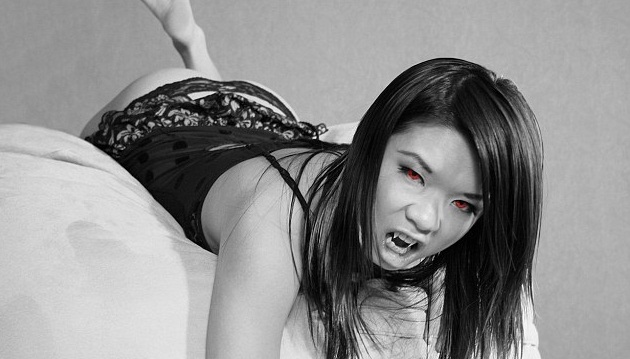I know we just had an Ethics Quiz, but this is too good to pass up.
San Francisco police officer Gared Hansen has filed a lawsuit against the city. He says he was unfairly suspended because in his non-uniformed down-time, he is an artist with an unusual passion. He photographs nearly-naked women dressed, made-up, or painted to evoke mythical creatures. You know, like this:
Or this…
..or, if you prefer, this:
So here is your Ethics Alarms Ethics Quiz for this Sunday:
Is such a hobby engaged in by one of its number sufficiently damaging to the credibility, dignity and image of the SF police force that it is reasonable for the officer to be disciplined? In short, should there be a corollary to “The Naked Teacher Principle” called the “Cop Who Paints Weird Naked Women Principle”?
I am very confident of my answer, which is “Absolutely not!” This is art, beyond any question. If this is pornography, Reubens paintings are pornography, and Reubens was no pornographer. Yes, the photos are kinky; yes, they are bizarre (though not terribly); sure, some people under the age of 90 might be offended by them. So what? Punishing Hansen is an abuse of power, enforcing conformity where it doesn’t belong, and disrespectful of his autonomy as a citizen, employee and human being. The police department has no right to dictate the off-duty artistic pursuits of its officers unless such art somehow legitimately undermined the public trust of interfered with the officer’s ability to do his job. How could Hansen’s photography possibly do either?
It can’t. Gared is the victim here.
A “Cop Who Paints Weird Naked Women Principle”?
No.
_______________________________________
Facts and Graphics: Daily Mail
Ethics Alarms attempts to give proper attribution and credit to all sources of facts, analysis and other assistance that go into its blog posts. If you are aware of one I missed, or believe your own work was used in any way without proper attribution, please contact me, Jack Marshall, at jamproethics@verizon.net.



I think calling it art is a bit of a stretch. I think calling it BAD art is a bit closer to the truth.
Everyone’s a critic, nu? Meantime, you’re absolutely correct. Gared is a victim here, and it would seem that the naked teacher principle is not in play for a number of reasons. Hope he gets a nice fat settlement. With any luck, he’ll put it into art school tuition, where maybe he can learn something.
Oh, it’s bad, all right…velvet Elvis bad. Community theater acting bad; Florence Foster Jenkins singing bad, Natalie Portman acting bad, Dan Brown writing bad. But its his hobby, and if he wants to hang that crap on his walls, the only ones it hurts are his guests.
Hey! Ease up on Natalie! ;->
(Who, I would argue, is the female doppelganger of Keanu Reeves)
Keanu’s more fun. “Speed.”
But every bit as tendentious. “Matrix”, 1 2 and 3. Which I loved. But not because of Keanu.
Natalie Portman Acting Bad?
Did you see Black Swan, by chance?
Eh. That makes up for one Star Wars movie. Even Tom Arnold made one good movie. I think she’s beautiful, inexpressive, languid, oddly sexless and wildly over-rated.
My daughter, a retired professional ballerina, refused to see “Black Swan” as a matter of principle, saying, “Why don’t they cast REAL dancers in such roles?” I don’t care, I enjoyed Portman’s performance thoroughly (ol’ Dad is a traitor!).
I am fairly conservative and likely biased toward protecting the reputation of the department, but these pictures, as tacky as they are, look like they would be First Amendment protected.
Put the story in a small town in the Bible-belt with a handful of cops? Maybe. But, San Francisco? Does anyone think these pictures are shocking anyone’s conscious?
Here’s a hypothetical headscrather for you – and trust me, I’m not making a value judgement here. Knowing this is San Francisco, If the models had been men instead of women, would this have been a news item?
More to the point, would he have been suspended?
Even more to the point, would he be a cause celebré?
Yes.
Of course there shouldn’t be a corollary to “The Naked Teacher Principle” called the “Cop Who Paints Weird Naked Women Principle.” I’ll take it a step further and say there shouldn’t be a Naked Teacher Principle, either. Otherwise you end up with an odious rule that would allow Officer Hansen to keep his job after taking these pictures, but which would require that if any of the women Hansen photographed were teachers, they should be fired. That doesn’t sound right.
It doesn’t sound right, but it is. A junior high English teacher has to make certain her students aren’t going to be masturbating to a web photo of her naked with fangs, and she can and should—-by not posing for any. A policeman shouldn’t care about the sexual fantasies of felons, and that’s a material difference.
But what if the pictures the teacher posed for are ‘Art”? I mean if a kid is determined to masturbate to his teacher, he’ll find a way. In the end, who cares about that?
This isn’t a constitutional issue. A teacher who tells a newspaper that Asians, in her opinion, are inferior and smell bad will be fired and can be fired, just like the exec who berated the Chic-fil-A clerk could and should be fired. Constitutional activity that undermines your ability to do your job is activity you can engage in, but do at your own risk. It doesn’t matter why the teacher posed nude, or whether the result is art. The point is that one can’t be on the internet nude and effectively teach kids. You can if you are just arresting them.
The point is the on can’t be on the internet nude and effectively teach kids.
So you say, but why not? I can see porn, where there might be some bad decision-making skills involved, but what about “Art”? A nude sculpture of the teacher would forever disqualify him or her from teaching? Or photographs, of the tastefully nude variety? I don’t see the nude body as devasting as all that to completely ruin someone’s career forever.
I shouldn’t have to explain that, because it’s obvious. It’s also not all that hard to avoid being nude on the internet if one has two brain cells to rub together.
It’s not that obvious. Look, if students masturbating to naked pictures of their teacher makes her ineffective in class, then maybe you’ve got a point. But shouldn’t the school system wait to see if that actually happens? Shouldn’t they wait to see if she’s ineffective and then terminate her for that? After all, it used to be obvious that homosexuals should never be allowed to teach children. Even if it turns out they’re not all pedophiles, you just know that students wouldn’t have any respect for a queer teacher. But when we actually let gay people teach, it turns out not to be a problem.
I don’t think that makes sense, from a pedagogical or policy standpoint, however. A school needs to make its best judgment about what conduct undermines teacher authority, makes them appear as sex objects rather than authority figures, provides a distraction in class, or makes it impossible for a teacher to command respect. “Wait and see” seems to me to be both dangerous and irresponsible. If a teacher has sexualizing photos on the internet—and to a teen, almost any nude or nudish photos would be sexualizing, art, pornography or Drano ad—and ultimately turns out to be Debra LaFave, the school’s liability is off the charts, because they had a warning sign and ignored it.
Similarly with the teacher who wrote on her blog that she hated her students. I don’t think a school needs to wait and see if students believing their teacher hates them does tangible harm—I think the presumption is that it does harm, and that no student should go through a year believing her own teacher has it in for her. A student should not have to picture his teacher naked or in a thong when he’s supposed to be thinking about algebra, and its the teacher’s duty not to make it harder for him not to do that by picking inappropriate (for teachers) web activities.
She “has to make certain”….? How can anyone prevent such action? In the Musee d’Orsay in Paris is an oil painting, “La Source” (1856) by J. A. D. Ingres, that is much more whackable than anything produced by the teacher or the cop. It is called “fine art”. Where’s the difference?
Jack, excuse me but I smell something here. Besides bad art. If you’ve retold all of the story you are spot on, but I strongly suspect we’ve not been let in on something essential.
I have no inside information but suspect our artist friend somehow or someway too publicly attributed a connection between his hobby and his vocation, and the nature of that attribution was adjudged by somebody higher up the food chain than he to be analogous to “conduct unbecoming,,,,” or some such. And that’s why he was disciplined, not for being a lousy artist. If I’m wrong I owe you a Latte.
I honestly don’t see what difference that makes or should make. If a hobby isn’t illegal or in some way detrimental to the government or law enforcement, how can it be “unbecoming”?
The “conduct unbecoming..” part comes when an off-duty officer gives the perception of using his official position to enhance in any way his hobby. By tying his private persona too closely to his public authority. Bad example, but a business card that read: “Traffic Officer James Jones, Deluxe House Painter” would be unseemly. A foreseeable result of such a card could be a customer who believed by hiring Jones she might be able to avoid building code violation problems, because Jones is thought to outrank a code inspector. But I digress.
Does the “Naked Teacher Principle” only apply to High School teachers then? Since the student actions you mention as being the problem only apply to a certain age range, then it wouldn’t apply to elementary kids?
No. I used masturbation illustratively. I think it applies at all levels. It also goes to judgment and trustworthiness.
Just to clarify…. NTP in your definition says “Secondary School Teacher” and that the point of the principle is to say that “they can’t complain” if they are fired due to their naked images.